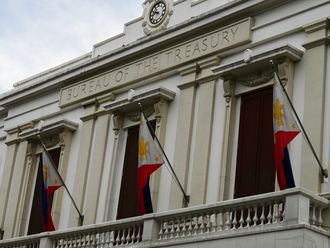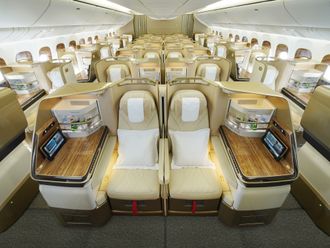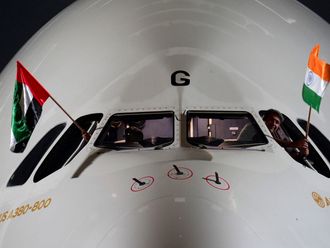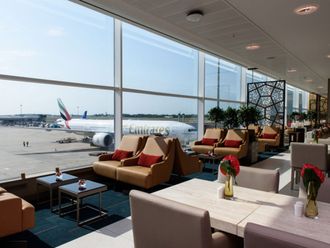Dubai: Economic sanctions against Syria are sending a message to the regional business community to distance itself from the regime of President Bashar Al Assad, according to experts,
Dr Abdul Hamid Radwan, a leading economist in the UAE Ministry of Foreign Trade, told Gulf News that the regime has changed from being a source of stability for the country — for the groups that are loyal to it — to a source of economic crises.
"Not only will the sanctions hurt the Syrian regime but they will also place additional pressure on Syrian traders, who have not yet taken a stance against Al Assad's regime, and make them unable to pay for their imports," he said.
Since the sanctions will likely continue as long as Al Assad's regime remains in power, Syria's economic problems could result in increased resentment against the government and contribute to the regime's fall.
Abdul Razzaq said the effect of sanctions will not impact Syrian businessmen in the UAE, because most of them do not have business partnerships with the government.
Legitimacy
The most important effect from the sanctions could be the erosion of the Al Assad government's legitimacy in the eyes of the population that have been hesitant to join the uprising.
The Arab League on Sunday slapped stringent sanctions on Syria in the strongest blow yet to Al Assad's regime.
The League's sanctions halt transactions with Syria's central bank, freeze Syrian assets in other Arab states, and Arab investment in Syria. They also impose a travel ban on senior Syrian officials. Arab finance and economy ministers have stressed the need to avoid measures which would harm ordinary citizens. Basic commodities and cash remittances from Syrians working in other countries are exempt.
Qatar's Prime Minister Shaikh Hamad Bin Jasem Bin Jabr Al Thani, who chaired the Cairo meeting, made the announcement. Bin Jasem said the decision, which is to take immediate effect, was backed by 19 of the league's 22 members.
Shaikh Hamad expressed frustration over the long political discussions, stressing that the Arab League could "keep discussing the matter for another year, and issuing new decrees," but the Syrian people would continue to die.
Dr Messef Abdul Razzaq, Chairman of the Syrian Business Council in Dubai, told Gulf News that the league sanctions will affect Syrian citizens, especially the poor, more than the regime.
Arab League Secretary-General Nabeel Al Arabi said the bloc will reconsider the sanctions if Syria carries out an Arab-brokered peace plan that includes sending observers to the country and pulling tanks off the streets.
"We call on Syria to quickly approve the Arab initiative," he said.
Opposition to sanctions seemed likely to weaken their impact. Iraq, Syria's largest Arab trading partner, abstained after making clear that it would not back punitive measures, partly in the light of its own experience under Saddam Hussain.
Lebanon, still dominated politically by its larger eastern neighbour, voted against the sanctions.
The league said it had postponed a proposed ban on Arab civilian airlines flying from and to Syria but will impose it later.
Dr. Mohammad Al Asoomi, a UAE-based economist, said the nature of the crisis is more political than economic.
Negative impact
However, he added the imposed economic difficulties are adding to an already difficult situation that has continued over the past eight months.
"No doubt that all this is having a negative impact on the capabilities of the government and on standards of living for the majority of citizens," he said.
In Syria government projects and private investment have stopped, capital has fled abroad, and the tourism sector, which makes up 12 per cent of Syria's GDP, has nearly evaporated. Industrial production has shrunk, resulting in unemployment for part of its workforce, agriculture is affected heavily due to the vast army operations, exports have been cut to half, unemployment has increased to around 25 per cent, and prices have risen due to widespread shortages.
The European Union halted imports of Syrian oil, which account for 90 per cent of the country's revenues, causing it to lose about $400 million a month.
"The league's suspension of dealings with the Syrian central bank will be the most effective measure," he said. "This will cut the money lifeline that Syrian businesses have to trade with the Arab world in particular. Moreover, it will allow the migration of capital from Syria."
Radwan added that US sanctions have crippled Syria's financial sector by prohibiting any individuals or institutions based in Syria from executing international transactions in US dollars. It is estimated that the Syrian economy will shrink by 6 per cent this year, he added.
Syria's trade with the EU is based mostly on oil exports, which were halted by the EU sanctions. But in the past few days, Iran bought an 80,000 tonne shipment of Syrian oil, the first since the sanctions were imposed. Syria's second biggest trade partner, Iraq, which abstained in a vote to suspend Syria's membership in the Arab League, might not commit to imposing Arab League sanctions.
Effect on Syrians
"Unfortunately, Syrian citizens will also be hurt by the sanctions as they already face oil and gas shortages and increases in prices of commodities," Radwan said. "The situation in Syria is getting very critical. Food prices are soaring, gas cylinders are not available in the market as well, so we are forced to store petrol in our houses."
The impact of trade sanctions depends on Syria's trade partners. Its biggest partner is the EU, with 22.5 per cent of Syria's foreign trade, followed by Iraq, 13.3 per cent; Saudi Arabia, 9 per cent; China, 6.9 per cent; Turkey, 6.6 per cent; Lebanon, 6.1 per cent; Russia, 3 per cent.
Half of Syrian trade is with the Arab world, and a quarter of all of Syria's imports come from the region.
- 19 - of 22-member Arab League voted for sanctions
- $400m - revenue lost due to EU sanctions on oil exports
- 50% - of Syria's trade is with the Arab world
— With inputs from agencies












